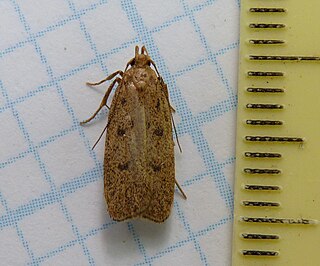
Gelechioidea is the superfamily of moths that contains the case-bearers, twirler moths, and relatives, also simply called curved-horn moths or gelechioid moths. It is a large and poorly understood '"micromoth" superfamily, constituting one of the basal lineages of the Ditrysia.

The Blastobasidae are a family of moths in the superfamily Gelechioidea. Its species can be found almost anywhere in the world, though in some places they are not native but introduced by humans. In some arrangements, these moths are included in the case-bearer family (Coleophoridae) as subfamily Blastobasinae. The Symmocidae are sometimes included in the Blastobasidae as subfamily or tribe.

Scythrididae is a family of small moths in the superfamily Gelechioidea. The family is sometimes included in the Xyloryctidae as a subfamily Scythridinae, but the Xyloryctidae themselves have sometimes been included in the Oecophoridae as subfamily. Scythrididae adults are smallish to mid-sized moths, which when at rest appear teardrop-shaped.

Holcocera is a gelechoid moth genus of the family Blastobasidae. There are about 70 described species.
Neoblastobasis is a genus of moths in the family Blastobasidae.

Pigritia is a genus of moths in the family Blastobasidae.
Pseudohypatopa is a genus of moths in the family Blastobasidae. The genus was described by Sinev in 1986.

Ethmia is a large genus of small moths. It is the type genus of the gelechioid family Ethmiidae, which is sometimes included in Elachistidae or Oecophoridae as subfamily.

Depressaria is a genus of moths in the superfamily Gelechioidea. It is the type genus of subfamily Depressariinae, which is often – particularly in older treatments – considered a distinct family Depressariidae or included in the Elachistidae, but actually seems to belong in the Oecophoridae.

The Symmocinae are a subfamily of moths in the superfamily Gelechioidea. These small moths are found mainly in the Palearctic and Africa.

Elachista is a genus of gelechioid moths described by Georg Friedrich Treitschke in 1833. It is the type genus of the grass-miner moth family (Elachistidae). This family is sometimes circumscribed very loosely, including for example the Agonoxenidae and Ethmiidae which seem to be quite distinct among the Gelechioidea, as well as other lineages which are widely held to be closer to Oecophora than to Elachista and are thus placed in the concealer moth family Oecophoridae here.
Blastobasis vittata is a moth of the family Blastobasidae. It was thought to be endemic to Madeira but is now known to inhabit the Netherlands, France, the Channel Islands, England and Northern Ireland.

Agonopterix is a moth genus of the superfamily Gelechioidea. It is placed in the family Depressariidae, which was often – particularly in older treatments – considered a subfamily of the Oecophoridae or included in the Elachistidae.
Blastobasis repartella is a moth in the family Blastobasidae. It is found in the United States, including Colorado, Maine, South Dakota and Illinois.
Blastobasis indigesta is a moth in the family Blastobasidae. It is found in Zimbabwe.
Blastobasis determinata is a moth in the family Blastobasidae. It is found in South Africa.

Blastobasis marmorosella is a moth in the family Blastobasidae. It is found on the Canary Islands, Madeira and in Portugal and Spain. This species has been accidentally introduced to Australia and New Zealand.
Blastobasis confectella is a moth in the family Blastobasidae. It is found in the United States, including Texas.











